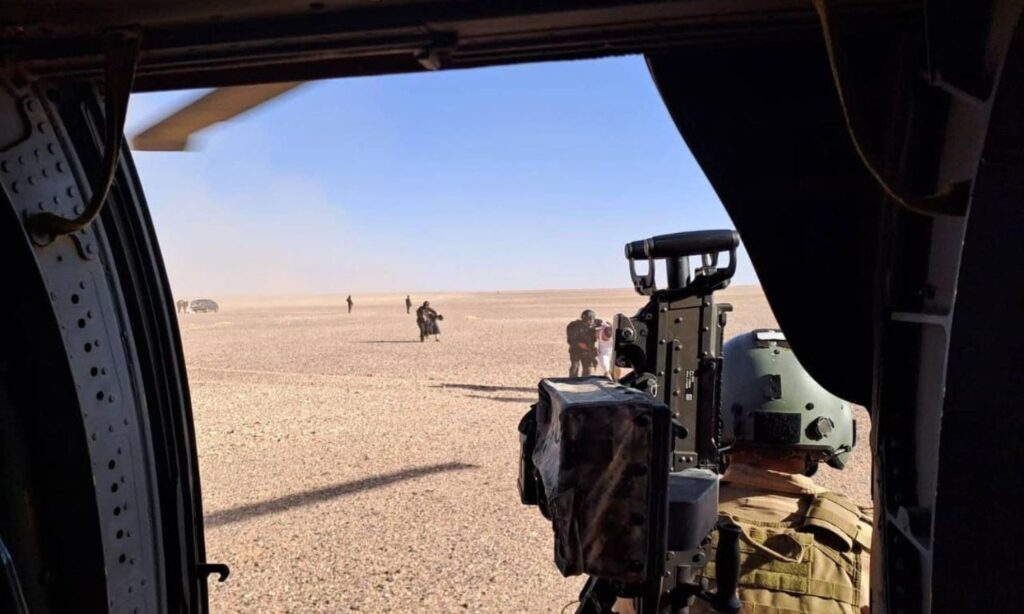The Jordanian strikes on points and locations in southern Syria as part of Amman’s war on drugs lacked the clarity that preceded this stage, which manifested through hints of Jordanian military action in Syria since May 2023.
Jordan’s foreign minister, Ayman Safadi, was resolute in his comments on the ongoing smuggling from Syria toward his country, saying, “We do not take drug smuggling lightly.”
This clarity also came through by placing responsibility and blame for the failure to control the borders on the regime, as the director of military media in the Jordanian armed forces, Mustafa al-Hayari, referred to a responsibility that falls on the “Syrian state”, and that communications between Amman and Damascus regarding drug smuggling have occurred more than once but have not borne fruit.
As the intensity of Jordanian bombardment increases, which on January 18 resulted in nine civilian deaths and three injuries, the clarity in the threat and assigning culpability remained less than it was, as Amman did not explicitly adopt responsibility for the operations it carries out inside its neighboring country’s borders.
The matter was limited to news circulated by unofficial Jordanian media outlets, not including the official news agency, reporting on strikes by the Jordanian Air Force and the Royal Jordanian Air Force in southern Syria, targeting a house and warehouses in the As-Suwayda governorate.
These reports preceded the latest strike that resulted in nine deaths, to which the Syrian regime responded in line with its reaction to previous Jordanian bombing rounds, summarized by utter silence and the absence of any official comment.
Intelligence methods
Dr. Omar Basha al-Raddad, a Jordanian expert in strategic security, explained to Enab Baladi that Jordan directs strikes at groups it classifies as terrorist, even if the title of their activity is drug smuggling, and it is a war that adopts known intelligence methods including secrecy as a framework for Jordanian operations.
Al-Raddad also pointed to operations carried out by these gangs, which are supported by circles within the Syrian leadership and militias affiliated with Iran, which operate with greater freedom in southern Syrian areas after Russia was preoccupied with the war against Ukraine, as these militias do not claim responsibility for launching drones towards Jordan loaded with drugs and weapons.
The Jordanian expert ruled out coordination between Amman and Damascus at the level of military leadership on both sides, pointing to the Jordanian warnings, complaints, and repeated threats, accusing the regime of not responding to warnings about smuggling gangs, without confirming or completely denying the possibilities of coordination between the border guard units on both sides.
The Saudi newspaper “Asharq Al-Awsat” reported on December 20, 2023, that the complications of the security situation on the Jordanian-Syrian border reflected politically on the level of communications between the two sides, which became almost cut off.
The newspaper clarified that on more than one occasion, Amman expressed its annoyance at the Syrian side’s failure to fulfill its military and security commitments on the borders “protected from one side.”
Jordanian security decision-making centers see Damascus’s lack of seriousness in curtailing the militias as the other side of the coin in exporting the regime’s crises towards neighboring countries.
The regime is in trouble
While Jordanian comments were limited to news from non-governmental media, Syrian official media ignored the killing of civilians in As-Suwayda by the Jordanian strike, while the local radio station “Sham FM,” close to the regime, reported through its correspondent in As-Suwayda, that ten deaths and three injuries were caused by the Jordanian air force targeting two houses in the town of Arman in the southern countryside of As-Suwayda, and the Syrian Ministry of Foreign Affairs did not comment on the incident until the preparation of this report.
Regarding the reasons for the Syrian regime’s silence on the Jordanian strikes, expert Omar Basha al-Raddad believes that the Syrian regime is in trouble, as it is unable to respond, knowing that any response would mean opening a front for it in addition to the northwestern and eastern fronts, with a reference to divisions at both the political and military levels, as security and political circles within the regime are implicated in providing coverage for smuggling militias, especially those closest to the Iranian leadership.
Al-Raddad also pointed out that despite the Syrian regime taking positions and policies that contradict its commitments on the backdrop of its return to the Arab League, it tries to pass these strikes perhaps to suggest that it contributes to the fight against drugs, a tactic used by the Iranian leadership, and perhaps confirming this fact is the dominance of Iranian militias over the south of Syria, and that the decision is in the hands of these militias and not the “Syrian government”.
As drug smuggling operations from Syria continue on a regional scale towards neighboring countries, first and foremost Jordan, then the Arab Gulf countries, the regime is promoting drug counteraction through repeated announcements by its government’s Ministry of Interior about arresting individuals “involved” in drug trafficking and local promotion, but the reality related to the file does not indicate Jordanian or Arab conviction with this promotion.

